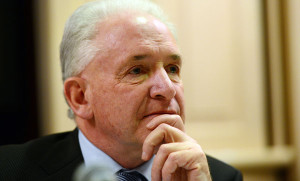
By Sarah Mac Donald - 30 January, 2018
 Censured Redemptorist priest Fr Tony Flannery has warned that the Church’s rule on mandatory celibacy is not working and is contributing to addictive behaviours among some clergy.
Censured Redemptorist priest Fr Tony Flannery has warned that the Church’s rule on mandatory celibacy is not working and is contributing to addictive behaviours among some clergy.
Speaking to the Sunday Herald newspaper in Scotland ahead of delivering a lecture on 28 February at Edinburgh University on ‘Celibacy, sexuality and the crisis in the priesthood’, the 71-year-old stated, “The rule on celibacy has to be changed because it is not working. Fewer and fewer young men are interested in becoming priests because the oath of celibacy is a big deterrent.”
He highlighted how Catholic priests could marry up until the 13th century. “It’s purely a church regulation and as such it can be changed.
“In my experience, for a lot of priests, celibacy has been a struggle which can lead to difficulties, such as addictive behaviours.”
More contentiously, Fr Flannery suggested that celibacy could be “a factor” in clerical child abuse cases. “It’s something that should be examined carefully by the Catholic church,” he said.
“The Australian investigation into child sexual abuse in institutions, in the final summing up, suggests compulsory celibacy was a factor. One of the recommendations they made was the Catholic church lift the rule on compulsory celibacy.”
However, a spokesperson for the Catholic Church in Scotland told the Sunday Herald, “To suggest celibacy is a deterrent to vocations is demonstrably not true … in Scotland the number of men studying for the priesthood has increased every year for the last 10 years.”
Last year, 12 men were ordained priests in Scotland, the highest figure in 20 years. There are currently 18 seminarians studying for the priesthood, the highest figure for over a decade.
Fr Flannery was censured by the Church in 2012 and threatened with ex-communication over his support for women priests.
However, he remains resolutely committed to the issue, despite the risk of possibly incurring further sanctions from the Vatican’s Congregation for the Doctrine of the Faith.
“I am fully supportive of the ordination of women,” he said. “I want women to have full equality in the church. At the moment women have no voice in decision-making in the church. That is so wrong and outdated that it has to change. I see women as essential for the credibility of the Catholic church going forward.”
He acknowledged to the Scottish newspaper, “I am no longer allowed to minister publicly as a priest. That happened six years ago. As a consequence, I have been on the fringes of the church. It’s affected my opinion of the Vatican.
“My main dispute there wasn’t so much that they objected to things I had written. I don’t mind that. The authority structure has the right to question people. My main problem was the process in which the Vatican dealt with me was totally unjust.
“I had no opportunity to defend myself. I was never told who accused me or the nature of the allegation. I was never communicated with directly by the Vatican. There was no court of appeal.”